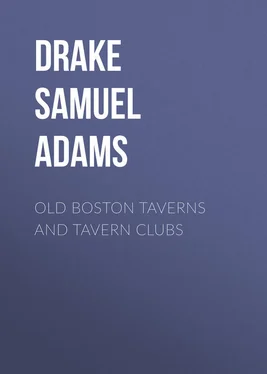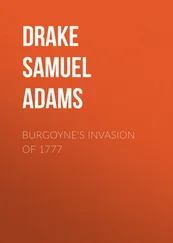Samuel Drake - Old Boston Taverns and Tavern Clubs
Здесь есть возможность читать онлайн «Samuel Drake - Old Boston Taverns and Tavern Clubs» — ознакомительный отрывок электронной книги совершенно бесплатно, а после прочтения отрывка купить полную версию. В некоторых случаях можно слушать аудио, скачать через торрент в формате fb2 и присутствует краткое содержание. Жанр: foreign_antique, foreign_prose, на английском языке. Описание произведения, (предисловие) а так же отзывы посетителей доступны на портале библиотеки ЛибКат.
- Название:Old Boston Taverns and Tavern Clubs
- Автор:
- Жанр:
- Год:неизвестен
- ISBN:нет данных
- Рейтинг книги:4 / 5. Голосов: 1
-
Избранное:Добавить в избранное
- Отзывы:
-
Ваша оценка:
- 80
- 1
- 2
- 3
- 4
- 5
Old Boston Taverns and Tavern Clubs: краткое содержание, описание и аннотация
Предлагаем к чтению аннотацию, описание, краткое содержание или предисловие (зависит от того, что написал сам автор книги «Old Boston Taverns and Tavern Clubs»). Если вы не нашли необходимую информацию о книге — напишите в комментариях, мы постараемся отыскать её.
Old Boston Taverns and Tavern Clubs — читать онлайн ознакомительный отрывок
Ниже представлен текст книги, разбитый по страницам. Система сохранения места последней прочитанной страницы, позволяет с удобством читать онлайн бесплатно книгу «Old Boston Taverns and Tavern Clubs», без необходимости каждый раз заново искать на чём Вы остановились. Поставьте закладку, и сможете в любой момент перейти на страницу, на которой закончили чтение.
Интервал:
Закладка:
The Red Lion, in North Street, was one of the oldest public houses, if not the oldest, to be opened at the North End of the town. It stood close to the waterside, the adjoining wharf and the lane running down to it both belonging to the house and both taking its name. The old Red Lion Lane is now Richmond Street, and the wharf has been filled up, so making identification of the old sites difficult, to say the least. Nicholas Upshall, the stout-hearted Quaker, kept the Red Lion as early as 1654. At his death the land on which tavern and brewhouse stood went to his children. When the persecution of his sect began in earnest, Upshall was thrown into Boston jail, for his outspoken condemnation of the authorities and their rigorous proceedings toward this people. He was first doomed to perpetual imprisonment. A long and grievous confinement at last broke Upshall’s health, if it did not, ultimately, prove the cause of his death.
The Ship Tavernstood at the head of Clark’s Wharf, or on the southwest corner of North and Clark streets, according to present boundaries. It was an ancient brick building, dating as far back as 1650 at least. John Vyal kept it in 1663. When Clark’s Wharf was built it was the principal one of the town. Large ships came directly up to it, so making the tavern a most convenient resort for masters of vessels or their passengers, and associating it with the locality itself. King Charles’s commissioners lodged at Vyal’s house, when they undertook the task of bringing down the pride of the rulers of the colony a peg. One of them, Sir Robert Carr, pummeled a constable who attempted to arrest him in this house. He afterward refused to obey a summons to answer for the assault before the magistrates, loftily alleging His Majesty’s commission as superior to any local mandate whatever. He thus retaliated Governor Leverett’s affront to the commissioners in keeping his hat on his head when their authority to act was being read to the council. But Leverett was a man who had served under Cromwell, and had no love for the cavaliers or they for him. The commissioners sounded trumpets and made proclamations; but the colony kept on the even tenor of its way, in defiance of the royal mandate, equally regardless of the storm gathering about it, as of the magnitude of the conflict in which it was about to plunge, all unarmed and unprepared.
III.
IN REVOLUTIONARY TIMES
Such thoroughfares as King Street, just before the Revolution, were filled with horsemen, donkeys, oxen, and long-tailed trucks, with a sprinkling of one-horse chaises and coaches of the kind seen in Hogarth’s realistic pictures of London life. To these should be added the chimney-sweeps, wood-sawyers, market-women, soldiers, and sailors, who are now quite as much out of date as the vehicles themselves are. There being no sidewalks, the narrow footway was protected, here and there, sometimes by posts, sometimes by an old cannon set upright at the corners, so that the traveller dismounted from his horse or alighted from coach or chaise at the very threshold.
Next in the order of antiquity, as well as fame, to the taverns already named, comes the Bunch of Grapesin King, now State Street. The plain three-story stone building situated at the upper corner of Kilby Street stands where the once celebrated tavern did. Three gilded clusters of grapes dangled temptingly over the door before the eye of the passer-by. Apart from its palate-tickling suggestions, a pleasant aroma of antiquity surrounds this symbol, so dear to all devotees of Bacchus from immemorial time. In Measure for Measure the clown says, “’Twas in the Bunch of Grapes, where indeed you have a delight to sit, have you not?” And Froth answers, “I have so, because it is an open room and good for winter.”
This house goes back to the year 1712, when Francis Holmes kept it, and perhaps further still, though we do not meet with it under this title before Holmes’s time. From that time, until after the Revolution, it appears to have always been open as a public inn, and, as such, is feelingly referred to by one old traveller as the best punch-house to be found in all Boston.
When the line came to be drawn between conditional loyalty, and loyalty at any rate, the Bunch of Grapes became the resort of the High Whigs, who made it a sort of political headquarters, in which patriotism only passed current, and it was known as the Whig tavern. With military occupation and bayonet rule, still further intensifying public feeling, the line between Whig and Tory houses was drawn at the threshold. It was then kept by Marston. Cold welcome awaited the appearance of scarlet regimentals or a Tory phiz there; so gentlemen of that side of politics also formed cliques of their own at other houses, in which the talk and the toasts were more to their liking, and where they could abuse the Yankee rebels over their port to their heart’s content.
But, apart from political considerations, one or two incidents have given the Bunch of Grapes a kind of pre-eminence over all its contemporaries, and, therefore, ought not to be passed over when the house is mentioned.
On Monday, July 30, 1733, the first grand lodge of Masons in America was organized here by Henry Price, a Boston tailor, who had received authority from Lord Montague, Grand Master of England, for the purpose.
Конец ознакомительного фрагмента.
Текст предоставлен ООО «ЛитРес».
Прочитайте эту книгу целиком, купив полную легальную версию на ЛитРес.
Безопасно оплатить книгу можно банковской картой Visa, MasterCard, Maestro, со счета мобильного телефона, с платежного терминала, в салоне МТС или Связной, через PayPal, WebMoney, Яндекс.Деньги, QIWI Кошелек, бонусными картами или другим удобным Вам способом.
Интервал:
Закладка:
Похожие книги на «Old Boston Taverns and Tavern Clubs»
Представляем Вашему вниманию похожие книги на «Old Boston Taverns and Tavern Clubs» списком для выбора. Мы отобрали схожую по названию и смыслу литературу в надежде предоставить читателям больше вариантов отыскать новые, интересные, ещё непрочитанные произведения.
Обсуждение, отзывы о книге «Old Boston Taverns and Tavern Clubs» и просто собственные мнения читателей. Оставьте ваши комментарии, напишите, что Вы думаете о произведении, его смысле или главных героях. Укажите что конкретно понравилось, а что нет, и почему Вы так считаете.












